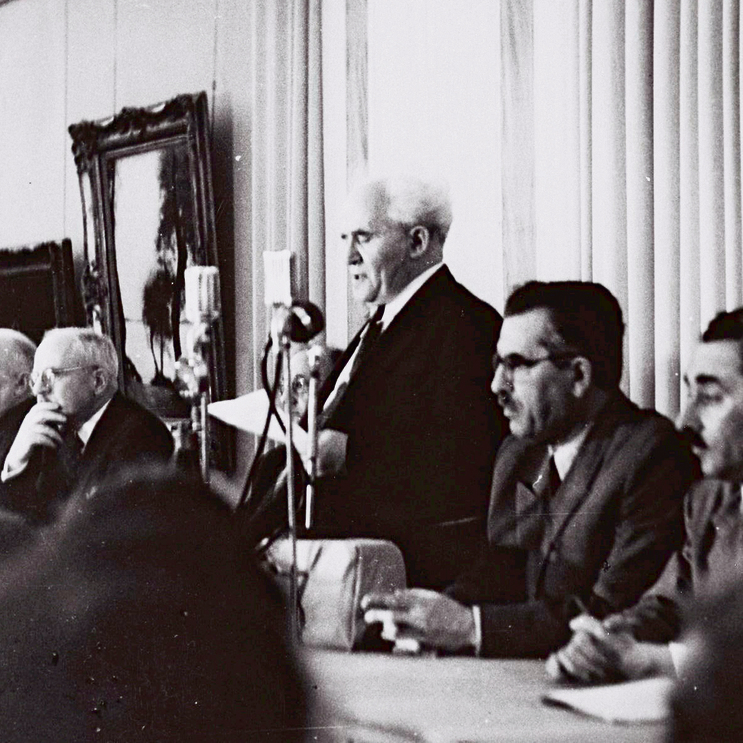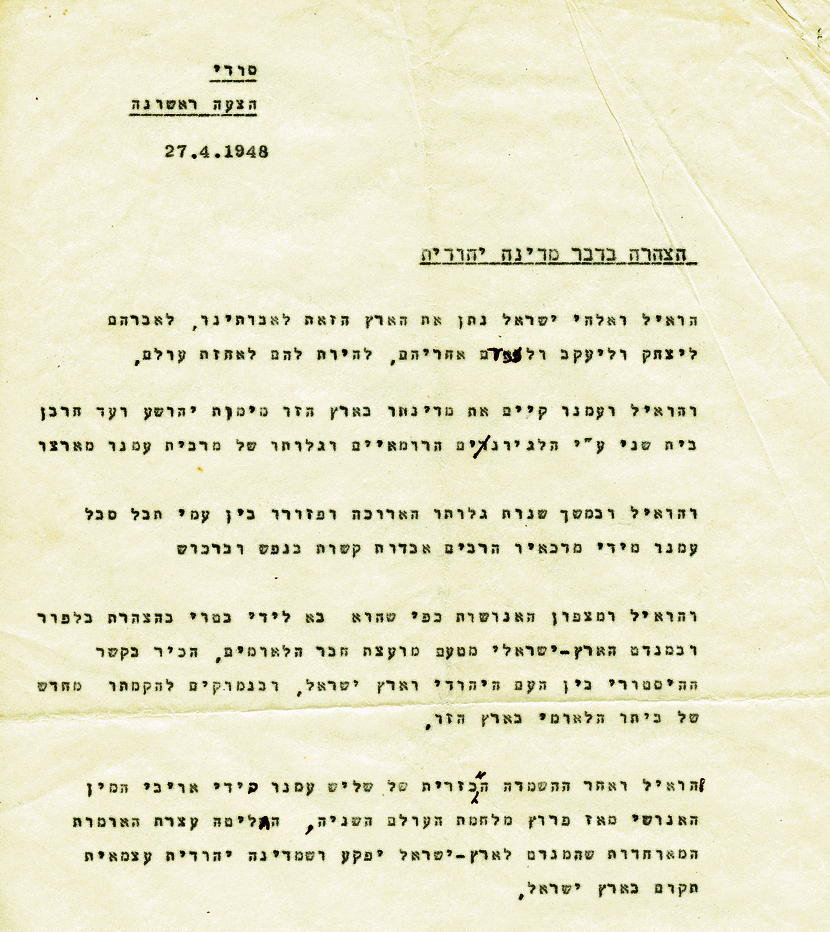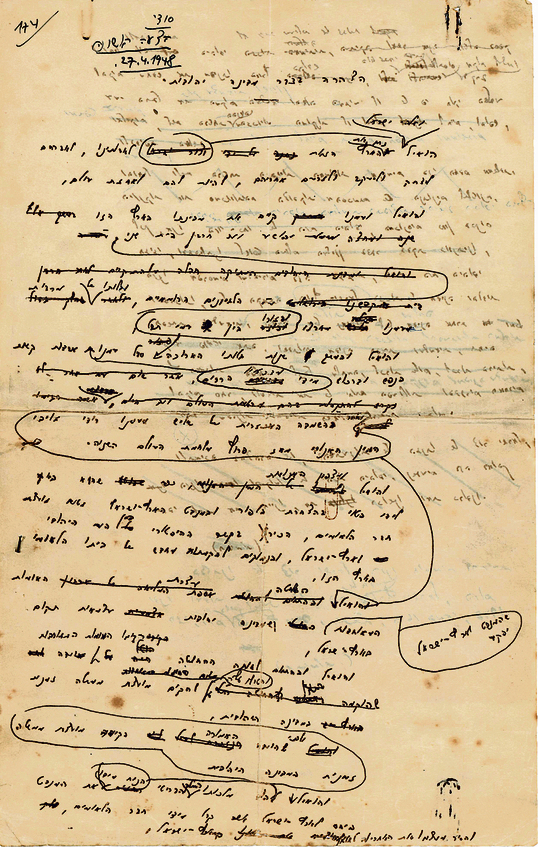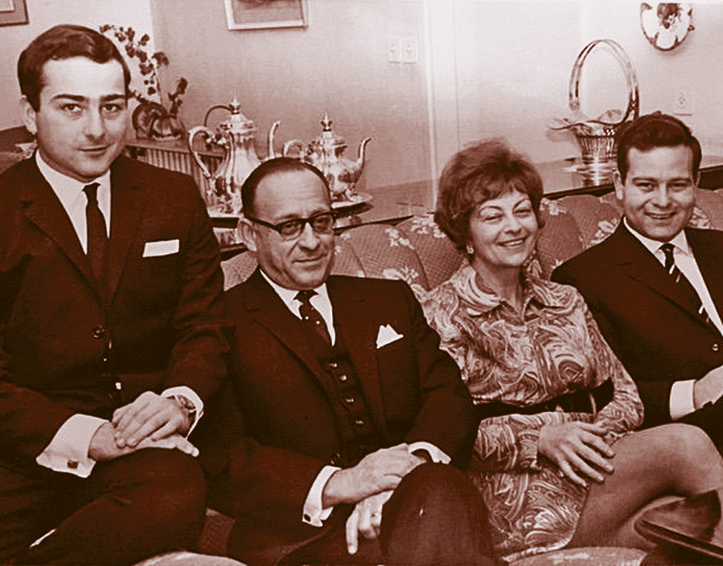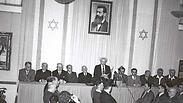

Drafts of Declaration of Independence to go on sale
A young lawyer named Mordechai Beham was tasked with wording the first draft of the Declaration of Independence in 1948; after learning his sons wanted to auction the drafts off to a public institution, the State of Israel sued, requesting the drafts be entrusted to the State Archives; court rejects state's suit.
Weeks before David Ben-Gurion declared the independence of the State of Israel on May 14, 1948, Pinchas Rosen, Israel's first justice minister, tasked a young lawyer named Mordechai Beham with drafting the declaration.
Beham's family kept the drafts he wrote throughout the years.
A year and a half ago, after learning Beham's sons Daniel and Refael planned to put the drafts up for auction, the State of Israel decided to sue them for the rights to hold the drafts in perpetuity.
While the starting bid for the auction set at NIS 1 million, it is estimated the drafts could go for $1 million too.
The state first learned of the Beham sons' intention to sell the drafts when the Kedem Auction House published its November 2015 catalog, in which documents dubbed as drafts of the Declaration of Independence authored by Mordechai Beham were offered on sale.
The state sued, claiming the documents were penned by Beham as part of his work for the state. Therefore, the state claimed, his sons cannot offer them up for sale and must therefore entrust the drafts to the State Archives for safekeeping. The state further claimed the documents had significant historical value.
The Beham sons, meanwhile, claimed the documents were the private property of their late father, who volunteered his services, and that he only started working in the service of the state after the documents were edited. They further argued the statute of limitations applies to the case.
The sons also said they would set conditions to the sale, namely that the documents cannot be taken out of Israel regularly and cannot be sold to a private individual, but rather only to a public institution such as a museum.
The state waited too long
In her ruling, Justice Tamar Bazak-Rappaport noted the family's possession of the documents was not kept in secret, and that senior government officials knew of their existence.
The Beham sons presented a letter their father wrote in 1968 to the trade minister at the time, in which he said, "To mark the 20th Independence Day, I've taken out of my safe documents I've been keeping from the period that preceded the Declaration of Independence, including the first draft of the declaration, which I prepared at the time.
"In regard to that, I remembered our conversation from a few years ago, in which I promised to get you a copy of this draft, and I am now happy to keep my promise."
In addition, one of Beham's sons said he was invited by the Knesset speaker to a ceremony uncovering the original Declaration of Independence at the Knesset in 1996. At this opportunity, he mentioned to the Knesset speaker's bureau chief that the family was in possession of the drafts.
The court determined the statute of limitations does not apply to the case, but rejected the lawsuit itself because the state waited decades before making its claim to the documents. "The state neglected its claimed rights for such a long period of time, all the while state officials knew of the documents Beham had in his possession," the judge wrote.
The judge ruled, therefore, that "the documents will not be entrusted to the State of Israel, though they will also not be denied from the public, in accordance with the respondents' commitments. In the spirit of the values of the Declaration of Independence, the aforementioned documents, which the state failed to prove ownership over, will remain in the possession of the respondents."
The state was also ordered to pay NIS 50,000 in court costs.
Ronen Ketzef, one of the lawyers representing the Beham family, said in response to the verdict that "Justice has been done to the memory of the drafts' author, the late attorney Mordechai Beham. This was a young lawyer who realized the enormity of the moment, volunteered his time as a private lawyer to the 'state-in-the-making,' and never asked—and certainly never received—any payment in return for his work. He merely sat at home in front of a blank page and started writing, until completing the drafts the state tried to claim ownership over. The state's attempt to rob the deceased's work documents was inappropriate, and it's a good thing the court set things right and defended (the family's) rights."
Ketezf noted the family kept the drafts safe for 67 years and committed of its own initative to only sell them to whoever commits to preserve them in the appropriate manner, display them at a public institution, such as a museum or a gallery, and not remove them from the country.
Refael Beham, the drafts' author's son, welcomed the ruling. "We're feeling great happiness. Justice has been served. The family recognizes the fact these are historical documents and should be on display to the public. We will honor our commitment and find the right way to do so. We're proud of the work our late father has done, of his love for the State of Israel and its institutions, and of his unique contribution in wording the first draft to the Declaration of Independence."














